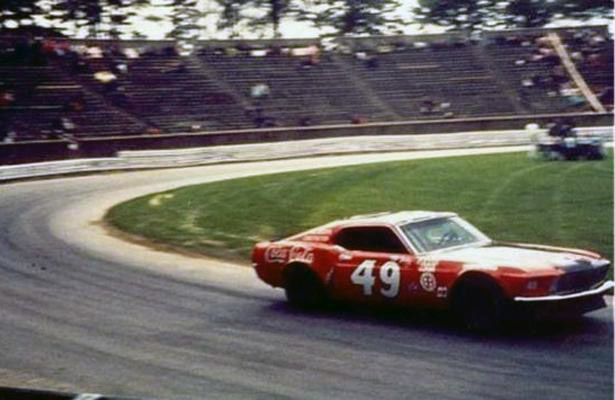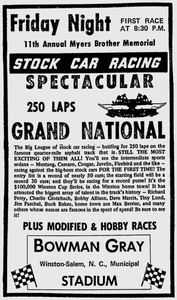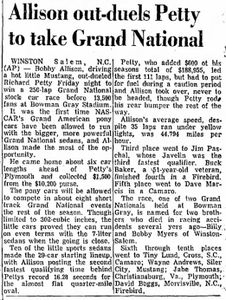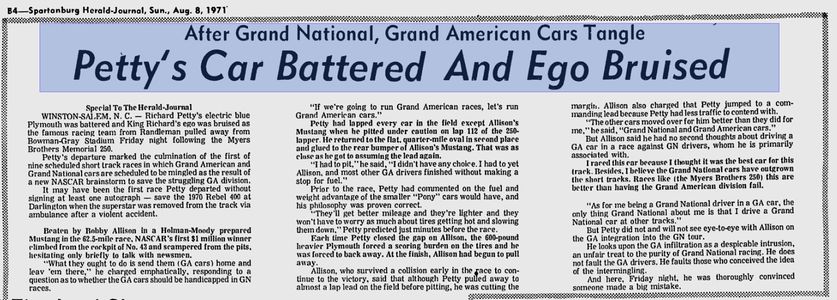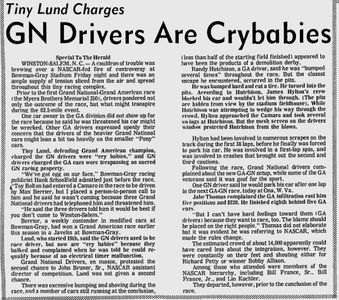1971 Myers Brothers 250 (lost footage and official documents of NASCAR Winston Cup Series race; 1971)
The 1971 Myers Brothers 250 was the 34th race of the 1971 NASCAR Winston Cup Series. Occurring on 6th August at the Bowman Gray Stadium in Winston-Salem, the race is deemed one of the most controversial in NASCAR history, because it is the only NASCAR race where no official winner has been declared.
Background
The 1971 Myers Brothers 250 was the 11th and final annual Winston Cup Series race at the Bowman Gray Stadium.[1] The Myers Brothers title was given in memory of two brothers who died in racing accidents, Billy and Bobby Myers.[2] The race would run for 250 laps, or just over 62.5 miles.[3]
The only Cup Series race to take place on the speedway in 1971,[4] it occurred during a challenging period for NASCAR.[5][6] The three largest Detroit manufacturers involved in the sport had toned down their sponsorship, resulting in decreased prize purses for races.[5] This in turn caused many Winston Cup Series events to suffer from low competition, as smaller teams generally were unwilling to compete for small prizes.[6][5] But it was not just the Cup Series that was suffering; the NASCAR Grand American Series was struggling with attracting both cars and fans, resulting in its 1971 season having only seven races rather than the previous year's 27.[5] Therefore, to revitalise both Series, NASCAR decided that six of its smaller races, starting with the Myers Brothers 250, would be combined Cup Series and Grand American events.[5][2][6] Thus, Grand American "pony" cars like the Ford Mustang, the Chevrolet Camaro, and the Dodge Javelin,[7] would be allow to compete alongside their Cup Series equivalents.[8][5][6][2][3]
However, the Cup Series regulars were unhappy with this decision.[2][6] While the pony cars had smaller engines that produced fewer horsepower, they were also lighter and had enhanced handling ideal for tracks like the Bowman Gray Stadium.[5] Thus, Cup drivers like Richard Petty were concerned the pony cars would dominate the higher-tier Cup cars, and made a protest against allowing them to compete, threatening a boycott if they were given the all clear.[6] A deal was reached where NASCAR enabled an additional ten Grand American cars to compete in the event,[2][7][3][6] under the agreement that the rules would face changes should the pony cars prove superior.[6][3] That still did not fully placate the majority of Cup drivers however, with allegations that some Cup drivers were prepared to wreck the Grand American cars during the race.[6][7] One driver, Max Berrier, was to be entering the race with a Camaro.[2] However, three Cup Series drivers allegedly told car owner Toy Bolt that it would be best for him not to enter a vehicle. Bolt ultimately withdrew from the event following these threats.[2]
Bobby Allison notably was not one of the regular Cup Series drivers to be against the inclusion of Grand American cars.[5][2][8][7][6] In fact, he decided to enter a 1970 Mustang for the event, deeming it to be better than any of the Cup Series vehicles, while also aiming to win rather than simply caring about earning points.[5][7][8][2][6][3] Despite this, when qualifying commenced prior to the race, it was Petty who won the pole position, achieving a record speed of 55.283 mph in his 1970 Plymouth, producing a laptime of 16.28s.[2][3] Allison qualified directly behind him, while Jim Paschal qualified third in a 1970 Javelin.[3] Nevertheless, Petty claimed prior to the race that the pony cars would have the advantage, predicting "they'll get better mileage and they're lighter and they won't have to worry as much about tires getting hot and slowing them down."[8]
The Race
With the starting order decided, the 1971 Myers Brothers 250 commenced on 6th August.[3] Petty maintained his lead at the start, and even dominated the first 112 laps without dropping the first position once.[5][3][8] He had managed to lap everyone bar Allison, the latter having survived an early collision.[8] Allison however alleged that the reason Petty had a near-lap lead on the field was that he was cutting the margin, and that The King had less traffic to pass.[8] Allison also claimed "the other cars moved over for him better than they did for me. Grand National and Grand American cars."[8] Other drivers in Grand American cars experienced trouble, including Randy Hutchison, who claimed his 1969 Camaro was bumped into a few times during the race.[2] However, tensions escalated when he entered the pits after cutting a tyre. He alleged that James Hylton's crew blocked his vehicle and refused to let him by.[2] As he tried to clear the crew, Hutchinson encountered Hylton, who attempted to punch Hutchinson several times.[2] Only the Camaro's mesh screen prevented any blows from actually landing.[2] Some labelled the race a "demolition derby" for the collisions between the Cup Series and Grand American drivers.[9]
However, during a caution on lap 112, Petty was forced to pit for fuel.[8][2] When he exited the pits, he was second, behind Allison's Mustang.[8][2][3] Ultimately, when the race restarted, Petty was unable to pass his opponent.[8][2][3] According to the Spartanburg Herald-Journal, the problem was that as Petty's Plymouth closed in on the Ford, it induced a scoring burden on the tyres, forcing him to increase his gap from Allison.[8] Allison meanwhile did not need to pit, and began to extend his lead overtime.[8][2][3] By the end, he had led the remaining 138 laps to cross the line first and claim $1,000 in prize money.[2][8][3][6] Petty came second, six-lengths behind Allison, with Paschal taking third.[2][8][3][6]
A furious Petty immediately left the track following the race.[8][6] He did speak to the press however, again criticising NASCAR's decision to run Grand American cars, stating "What they ought to do is send them (GA cars) home and leav 'em there. If we're going to run Grand American races, let's run Grand American cars".[8] Allison meanwhile had no regrets racing a Grand American vehicle, saying "I raced this car because I thought it was the best car for this track. Besides, I believe the Grand National cars have outgrown the short tracks. Races like (the Myers Brothers 250) this are better than having the Grand American division fail. As for me being a Grand National driver in a GA car, the only thing Grand National about me is that I drive a Grand National car at other tracks."[8] Tiny Lund, who finished sixth in a 1969 Camaro, labelled the Cup Series drivers as "crybabies" for their actions throughout the event, including protesting Lund being allowed to re-qualify following an electrical timer malfunction during qualifying.[2]
Bobby Allison's "85th Victory"
Bobby Allison had a highly successful career in NASCAR.[7] When he retired following a career-ending accident at the 1988 Miller High Life 500, he had officially won 84 races, ranking him joint-fourth for the highest number of wins, alongside long-term rival Darrell Waltrip.[7] However, Allison and many of his supporters argue that he had actually won 85.[7] The reason for this conflict is that despite crossing the line first in the 1971 Myers Brother 250, Allison is not officially credited by NASCAR as having won it.[7][2][5] According to the NASCAR officials involved in the race, Allison had not won the race simply because he was driving a Grand American car, rather than a legal Cup Series one.[7][5][2] Additionally, NASCAR historian Buz McKim claims that a NASCAR executive involved in the handling of the event informed him that Allison's car was disqualified a few days following the race.[7][9] He notes however that there is no evidence supporting the now-deceased executive's claim, especially when considering that the Mustang should not have been declared illegal if it passed an inspection the Saturday before the race.[7][9]
NASCAR's decision is deemed highly controversial, primarily due to its inconsistent nature.[7][5] Allison supporters note that Lund had crossed the line first in two other combination races later in the season in a Grand American vehicle.[7][5] While NASCAR originally did not deem Lund as the winner of either race, campaigning by his family led to officials overturning this decision.[5][7] Allison and his family have tried to get his victory properly recognised, but NASCAR has refused all appeals, leading to accusations of inconsistency in decision-making.[5][7][9] It also promotes another serious issue: the 1971 Myers Brothers 250 is as of the present day the only NASCAR event without an official winner.[7][5][9] With Petty having finished second in the race, NASCAR has refused to deem him the winner either.[7][9] It is a decision that The King supports.[7][9] In a July 2017 interview, Petty insisted "Bobby won but shouldn't have gotten credit for it. The cars weren't the same; those cars were too different. I shouldn't have gotten credit, but Bobby shouldn't have either. That was a Cup race, and he wasn't in a Cup car."[7][9]
Nevertheless, Allison remains adamant that he deserves official credit.[7][9] In a 2011 interview, he blamed NASCAR CEO Bill France Jr. for the decision, initially believing that Petty was given the win.[7] Because The King was not credited with the victory however, Allison still believes he should be given the win instead.[7] As Jimmie Johnson seemingly edged closer to overtaking Allison's number of wins, it did renew further campaigning from Allison's family for him to be credited, especially as this would delight him as he would officially move him past Waltrip.[7] The main barrier surrounds whether officials had told Grand American drivers that they would not be credited for a Cup win prior to the race, with Hutchison claiming no such speech was made.[7] Paperwork surrounding the race decisions have since been discarded by NASCAR.[9] Thus, it has led McKim to conclude that the situation may never be settled.[7][9]
Availability
According to NASCAR on TV, 45 minutes of highlights were televised by ABC on 14th August 1971 as part of its Wide World of Sports, alongside outdoor events.[10] However, the broadcast has yet to resurface, and no footage of the race is currently publicly available. Nevertheless, photos and newspaper clippings of the race remain viewable.[2][9] The official documents surrounding the race decision are likely permanently irrecoverable.[9]
Galley
Video
Images
See Also
- 1960 Daytona 500 (partially found footage of NASCAR Grand National Series race; 1960)
- 1960 Daytona Races (lost CBS and NBC televised footage of NASCAR prelude events to Daytona 500; 1960)
- 1961 Firecracker 250 (lost ABC footage of NASCAR Grand National Series race; 1961)
- 1962 Daytona 500 (partially found footage of NASCAR Grand National Series race; 1962)
- 1962 Firecracker 250 (lost ABC footage of NASCAR Grand National Series race; 1962)
- 1963 Firecracker 400 (partially found footage of NASCAR Grand National Series race; 1963)
- 1963 Richmond 250 (partially found footage of NASCAR Grand National Series qualifying session and race; 1963)
- 1964 Atlanta 500 (partially found footage of NASCAR Grand National Series race; 1964)
- 1964 National 400 (lost footage of NASCAR Grand National Series race; 1964)
- 1964 Richmond 250 (lost footage of NASCAR Grand National Series qualifying session; 1964)
- 1965 Daytona 500 (partially found footage of NASCAR Grand National Series race; 1965)
- 1965 Rebel 300 (partially found footage of NASCAR Grand National Series race; 1965)
- 1966 National 500 (lost footage of NASCAR Grand National Series race; 1966)
- 1966 Southern 500 (partially found footage of NASCAR Grand National Series race; 1966)
- 1967 Firecracker 400 (partially found footage of NASCAR Grand National Series race; 1967)
- 1967 Rebel 400 (partially found footage of NASCAR Grand National Series race; 1967)
- 1970 Alabama 500 (found footage of NASCAR Grand National Series race; 1970)
- 1970 National 500 (partially found footage of NASCAR Grand National Series race; 1970)
- 1970 Wilkes 400 (lost footage of NASCAR Grand National Series race; 1970)
- 1970 World 600 (lost footage of NASCAR Grand National Series race; 1970)
- 1971 Atlanta 500 (lost footage of NASCAR Winston Cup Series race; 1971)
- 1971 Medal of Honor Firecracker 400 (partially found footage of NASCAR Winston Cup Series race; 1971)
- 1971 National 500 (lost footage of NASCAR Winston Cup Series race; 1971)
- 1971 Rebel 400 (partially found footage of NASCAR Winston Cup Series race; 1971)
- 1971 Twin 125s (lost footage of NASCAR Daytona 500 qualifying races; 1971)
- 1972 Atlanta 500 (lost footage of NASCAR Winston Cup Series race; 1972)
- 1972 Bowman-Gray 100 (lost footage of NASCAR Grand American Series race; 1972)
- 1972 Carolina 500 (lost footage of NASCAR Winston Cup Series race; 1972)
- 1972 Daytona 500 (partially found footage of NASCAR Winston Cup Series race; 1972)
- 1972 Firecracker 400 (lost ABC footage of NASCAR Winston Cup Series race; 1972)
- 1972 National 500 (partially found footage of NASCAR Winston Cup Series race; 1972)
- 1972 Rebel 400 (lost footage of NASCAR Winston Cup Series race; 1972)
- 1973 Atlanta 500 (lost footage of NASCAR Winston Cup Series race; 1973)
- 1973 Medal of Honor Firecracker 400 (partially found footage of NASCAR Winston Cup Series race; 1973)
- 1974 Mason-Dixon 500 (lost footage of NASCAR Winston Cup Series race; 1974)
- 1974 National 500 (lost footage of NASCAR Winston Cup Series race; 1974)
- 1974 Twin 125s (lost footage of NASCAR Daytona 500 qualifying races; 1974)
- 1975 Champion Spark Plug 400 (lost footage of NASCAR Winston Cup Series race; 1975)
- 1975 Dixie 500 (lost footage of NASCAR Winston Cup Series race; 1975)
- 1975 Firecracker 400 (lost footage of NASCAR Winston Cup Series race; 1975)
- 1975 National 500 (lost footage of NASCAR Winston Cup Series race; 1975)
- 1975 Twin 125s (lost footage of NASCAR Daytona 500 qualifying races; 1975)
- 1975 World 600 (partially found footage of NASCAR Winston Cup Series race; 1975)
- 1976 Atlanta 500 (lost footage of NASCAR Winston Cup Series race; 1976)
- 1976 Champion Spark Plug 400 (lost footage of NASCAR Winston Cup Series race; 1976)
- 1976 Dixie 500 (lost CBS footage of NASCAR Winston Cup Series race; 1976)
- 1976 Firecracker 400 (lost footage of NASCAR Winston Cup Series race; 1976)
- 1976 National 500 (lost footage of NASCAR Winston Cup Series race; 1976)
- 1976 Rebel 500 (lost footage of NASCAR Winston Cup Series race; 1976)
- 1976 Riverside 400 (lost footage of NASCAR Winston Cup Series race; 1976)
- 1976 Talladega 500 (lost footage of NASCAR Winston Cup Series race; 1976)
- 1976 Winston 500 (lost footage of NASCAR Winston Cup Series race; 1976)
- 1976 World 600 (lost footage of NASCAR Winston Cup Series race; 1976)
- 1978 NAPA National 500 (lost footage of NASCAR Winston Cup Series race; 1978)
- 1979 Daytona ARCA 200 (lost footage of ARCA Racing Series race; 1979)
- 1979 Dixie 500 (lost ABC footage of NASCAR Winston Cup Series race; existence unconfirmed; 1979)
- 1979 Southeastern 500 (partially found footage of NASCAR Winston Cup Series race; 1979)
- 1981 Coca-Cola 500 (partially found footage of NASCAR Winston Cup Series race; 1981)
- 1981 CRC Chemicals 500 (lost footage of NASCAR Winston Cup Series race; 1981)
- 1982 CRC Chemicals 500 (lost footage of NASCAR Winston Cup Series race; 1982)
- 1982 Eastern 150 (lost footage of NASCAR Budweiser Late Model Sportsman Series race; 1982)
- 1982 Goody's Sportsman 300 (partially found footage of NASCAR Budweiser Late Model Sportsman Series race; 1982)
- 1982 Twin 125s race 1 (lost footage of NASCAR Daytona 500 qualifying race; existence unconfirmed; 1982)
- 1982 Winston Western 500 (lost footage of NASCAR Winston Cup Series race; existence unconfirmed; 1982)
- 1983 Goody's Sportsman 300 (partially found footage of NASCAR Budweiser Late Model Sportsman Series race; 1983)
- 1983 Mason-Dixon 500 (lost footage of NASCAR Winston Cup Series race; 1983)
- 1983 Southern 500 (lost footage of NASCAR Winston Cup Series race; existence unconfirmed; 1983)
- 1984 Delaware 500 (partially found footage of NASCAR Winston Cup Series race; 1984)
- 1984 Goody's Sportsman 300 (lost footage of NASCAR Busch Grand National Series race; 1984)
- 1984 Warner W. Hodgdon Carolina 500 (lost footage of NASCAR Winston Cup Series race; existence unconfirmed; 1984)
- 1985 Twin 125s (lost footage of NASCAR Daytona 500 qualifying races; existence unconfirmed; 1985)
- 1986 Twin 125s (lost footage of NASCAR Daytona 500 qualifying races; existence unconfirmed; 1986)
- 1989 Busch Clash (lost footage of pre-season NASCAR Winston Cup Series race; 1989)
- 1992 Atlanta 300 (lost footage of NASCAR Busch Grand National Series race; 1992)
- 1996 DeVilbiss SuperFinish 200 (partially found televised footage of NASCAR Craftsman Truck Series race; 1996)
- Jeff Gordon's 2008 UAW-Dodge 400 crash (lost on-board footage of NASCAR Sprint Cup Series race crash; 2008)
- NASCAR (partially found uncut footage of stock car races; 1960-present)
References
- ↑ DriverAverages listing races at Winston-Salem. Retrieved 9 Apr '22
- ↑ 2.00 2.01 2.02 2.03 2.04 2.05 2.06 2.07 2.08 2.09 2.10 2.11 2.12 2.13 2.14 2.15 2.16 2.17 2.18 2.19 2.20 2.21 2.22 2.23 RacersReunion detailing the race and the controversial decision to run Grand American cars, as well as providing newspaper clippings of the event. Retrieved 9 Apr '22
- ↑ 3.00 3.01 3.02 3.03 3.04 3.05 3.06 3.07 3.08 3.09 3.10 3.11 3.12 3.13 Racing-Reference detailing the qualifying and race results for the event. Retrieved 9 Apr '22
- ↑ Racing-Reference detailing the 1971 Winston Cup Series schedule. Retrieved 9 Apr '22
- ↑ 5.00 5.01 5.02 5.03 5.04 5.05 5.06 5.07 5.08 5.09 5.10 5.11 5.12 5.13 5.14 5.15 5.16 Grand National East detailing the decision to run Grand American cars, Allison selecting a Mustang to race in, and how the race has no official winner. Retrieved 9 Apr '22
- ↑ 6.00 6.01 6.02 6.03 6.04 6.05 6.06 6.07 6.08 6.09 6.10 6.11 6.12 6.13 Essentially Sports summarising the controversies surrounding this race. Retrieved 9 Apr '22
- ↑ 7.00 7.01 7.02 7.03 7.04 7.05 7.06 7.07 7.08 7.09 7.10 7.11 7.12 7.13 7.14 7.15 7.16 7.17 7.18 7.19 7.20 7.21 7.22 7.23 7.24 7.25 Autoweek detailing the controversy surrounding the race with no winner, and Allison and his family's campaigns to have him be credited as the winner. Retrieved 9 Apr '22
- ↑ 8.00 8.01 8.02 8.03 8.04 8.05 8.06 8.07 8.08 8.09 8.10 8.11 8.12 8.13 8.14 8.15 8.16 8.17 Spartanburg Herald-Journal reporting on Allison winning the race, and his and Petty's comments (article found on RacersReunion). Retrieved 9 Apr '22
- ↑ 9.00 9.01 9.02 9.03 9.04 9.05 9.06 9.07 9.08 9.09 9.10 9.11 9.12 Just a Car Guy detailing the controversies surrounding the race and Allison not being credited as the winner. Retrieved 9 Apr '22
- ↑ NASCAR on TV detailing ABC's broadcast of the race. Retrieved 9 Apr '22
